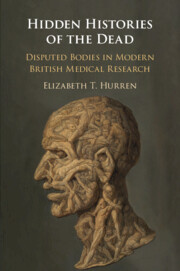This book complies with the Data Protection Act (1988) and recent GDPR (2018) in the UK. Anonymous names feature throughout the chapters. Each dissection case was given a unique identifier, known only to the author for ethical reasons. The new data is based on anatomical case material collected in the archives from 1945 to 2000. It is therefore beyond the one-hundred-year rule that historians often work with. All named cases have a unique set of letters. Each alphabetical description does not relate to the original names in the case files. This is to ensure that should there be any living relatives of the dead, their family name is not revealed. Sometimes, aspects of people’s personal backgrounds are additionally disguised to ensure privacy is not breached. Those names that are cited in full, as per the original files, have come from primary research material already in the public domain. These are often newspaper reports and media interviews where relatives chose to speak openly. They are set out in the footnotes. At all times, the author has sought to maintain confidentiality. Over a three-year period of research, extensive record linkage work checked each case file’s circumstances carefully. Anatomy records have therefore only been summarised and general statistics produced. If a representative case is cited, it has always been de-identified in such a way that it would be difficult to re-identify it. The author has tried to ensure that there are not any discrepancies or errors. If any have inadvertently arisen, then do please contact them on – eh140@le.ac.uk
Ethical Note
Published online by Cambridge University Press: 18 February 2021
Summary
- Type
- Chapter
- Information
- Hidden Histories of the DeadDisputed Bodies in Modern British Medical Research, pp. xviiiPublisher: Cambridge University PressPrint publication year: 2021
- Creative Commons
- This content is Open Access and distributed under the terms of the Creative Commons Attribution licence CC-BY-NC-ND 4.0 https://creativecommons.org/cclicenses/



